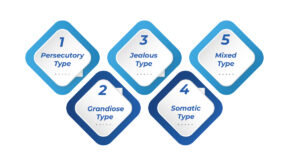People may mistake things that aren’t real or somehow wrong, and this can sometimes happen because of Delusional Disorder. This mental health condition causes people to believe these false ideas despite all the evidence to the contrary.
Similarly, someone with a personality disorder might appear normal in most situations, so it is hard for others to spot the problem. Catching the disease early on is very important. Read on and learn more about the signs, causes, and treatment options for the issue that affects your thinking.
What Is Delusional Disorder?
A person with delusional disorder strongly believes in things that are not true. Lots of delusions are about things that happen in life, such as being tracked, deceived, or monitored from a distance. Most people with delusional disorders are normal and seem unremarkable until mentioning their delusions.
In addition, experts aren’t sure why delusional disorder happens, though things such as genes, stress, or changes in brain chemicals might play a role. Therefore, addiction forms as someone becomes an adult and can affect their job, family, and routine activities. Managing the illness usually requires giving medicine to help fix problems and improve the quality of life.
Delusional Disorder Symptoms
Here are the signs of delusional disorder:
- Acting healthily when not discussing the delusion
- Trouble figuring out what is real from what is not
- Changing feelings like irritation or anger
- Being fearful or doubtful of those around you
- Behaving or debating from a false belief
- Isolation from society because of worry
- Lacking knowledge about their illness
Delusional Disorder Causes
1. Genetic
Most individuals with delusional disorder often have family members who have or have had this illness or someone else with a related disorder. It is also likely that genetics contributes to the process, too. If a child’s parents have this type of thinking, the child may be more likely to develop it because of their upbringing.
2. Biological
A few experts think that changes to certain parts of the brain involved in thinking, reasoning, and perception might show delusional disorder. Changes in the brain can make someone interpret situations incorrectly, leading to false beliefs or mistakes about daily life.
3. Environmental/Psychological
When someone is already at risk, things like trauma, a loss, or a major change in their life can lead to delusional disorder. Using drugs or alcohol for a long time can harm how the brain works. Some elderly or immigrant people with poor hearing or vision are at higher risk of developing delusions just because they do not get much social support.
Types of Delusion Disorder

1. Persecutory Type
This condition is seen most often. Someone being out to harm, spy on, or mistreat them is what people fear. You can feel that someone is following or planning to harm them. As a result, people are often afraid and don’t trust one another. The person can attempt to report others to the authorities.
2. Grandiose Type
The person comes to feel you possess great talent, power, or importance in this type. You may feel as though you found something major or have become famous. These thoughts have no basis. You may brag or share stories about what you have accomplished a lot. It can change the way people interact with their families or careers.
3. Jealous Type
You trust your gut feeling that your partner is cheating, yet there isn’t any evidence. Sometimes, you go through your partner’s messages, watch their movements, and frequently blame them for things. These thoughts keep coming and always make me feel bad. It may also end up in arguments or breakups. The feelings arise only from their fears, not from facts.
4. Somatic Type
People may think wrong things about their bodies. Someone may believe that you are experiencing an unusual illness or body issue. It is common for people to visit a lot of health professionals without ever finding a medical problem. People find these ideas distressing. Tests and promises of protection don’t stop them from being scared.
5. Mixed Type
In this way, a person may have two or more delusions and none is significantly more central. As another example, you could believe unknown people are tailing them and even insist you are famous. Such delusions can create problems in various areas of a person’s life. Treatment may be more challenging because the problem originates from multiple organisms.
Delusional Personality Disorder Vs. Delusional Thinking
Delusional Personality Disorder | Delusional Thinking |
| A diagnosable mental health condition involving fixed false beliefs. | A thought pattern involving unrealistic or irrational beliefs. |
| Significantly impairs social and occupational functioning. | It may not always interfere with daily life. |
| Requires a formal psychiatric evaluation and clinical criteria. | Not always diagnosable as a disorder. |
| Believing one is being followed despite no evidence. | Assuming someone dislikes you without a clear reason. |
How To Help Someone with Delusional Disorder?
1. Stay Calm and Supportive
It helps to remain patient and not argue when you speak with someone who has delusional disorder. Remaining caring and considerate helps people feel more confident in you. It’s better not to challenge their delusions since it might make them respond negatively.
2. Encourage Professional Treatment
Stress that reaching out to someone who can help will be good for them, holistically. Of course, you can help set up a consultation or come along with them. It’s common to use medicines to help handle some of the symptoms of the disease. Watch and wait because you could resist your direction at the beginning.
3. Avoid Challenging Their Delusions
When you confront their delusions directly, you can feel your words are threatening or upsetting. Focus on changing the conversation to things that are neutral or calming. Notice their emotions without agreeing with their false belief. This allows you to communicate without making their mood worse. Showing attention makes a good difference than arguing.
4. Set Healthy Boundaries
Make sure you’re taking care of yourself as you support your child. So, don’t help them engage in harmful acts that are a result of their delusions. Explain to them that you’re ready to be their support while also letting them know your limits. Having boundaries in place benefits you as a couple.
5. Awareness About the Disorder
Doing some research can give insight into your loved one’s current situation. Choose reliable information or contact professionals who can provide advice. Proper knowledge can help to clarify issues and ease your trouble. If you have more knowledge, you can help them in a better way.
Delusional Disorder Treatment
1. Psychiatric Evaluation
A delusional disorder can be diagnosed by first conducting a psychiatric evaluation. Both the patient’s thoughts, beliefs, behavior, and medical history are discussed in detail. The mental health provider evaluates the kind and degree of the delusions to tell them apart from other mental health problems. It helps us find out how delusions influence the way someone goes about their day and relates to others. It is very important to evaluate a patient carefully when preparing a treatment plan.
2. Medication Management
Usually, doctors rely on antipsychotic medications to decrease the strength of delusions. The provider analyzes the patient’s reactions to and complications from the medications and changes them accordingly. Monitoring the situation and compliance should be a regular duty. Through this method, doctors help manage mood and gain more understanding of unrealistic beliefs. MAVA Behavioral Health gives you comprehensive medicine management to promote lasting wellness.
Bottom Line
The treatment at MAVA Behavioral Health for Delusional Disorder uses individualized care, thorough psychiatric exams, and the help of expertly chosen medications. The provider will first do a complete review to see what the delusions mean and how much they affect the patient’s everyday life.
Normally, we are passionate about helping our patients see things more clearly, work on their abilities, and enjoy better stability in life. We’re here at MAVA Behavioral Health to help you on your way to mental wellness.
FAQs
What is Delusional Disorder?
Delusional Disorder is given as a diagnosis when a person still believes false things despite evidence that suggests otherwise. The situations in these belief systems resemble common events real people encounter.
What are the most frequent forms of delusions?
People sometimes have delusions of persecution, making them feel they are being attacked, delusions that they are important, jealous delusions, or delusions about their body health.
What signs do professionals use to spot Delusional Disorder?
To diagnose, professionals analyse a person’s thoughts, actions, and history of physical and mental health during an evaluation. Schizophrenia or similar disorders should be ruled out before treatment.
What brings on Delusional Disorder?
It isn’t clear about its real cause, but some think it could be due to genes, chemicals, or certain external causes. If you are stressed, have substance-related problems, or have relatives with mental illness, you might get an eating disorder.
Is there any effective method of treating Delusional Disorder?
Yes, doctors who practice allopathic medicine prescribe antipsychotics and also offer psychotherapy as treatment. The target is to manage the symptoms, increase the patient’s understanding, and support them in living life normally.









